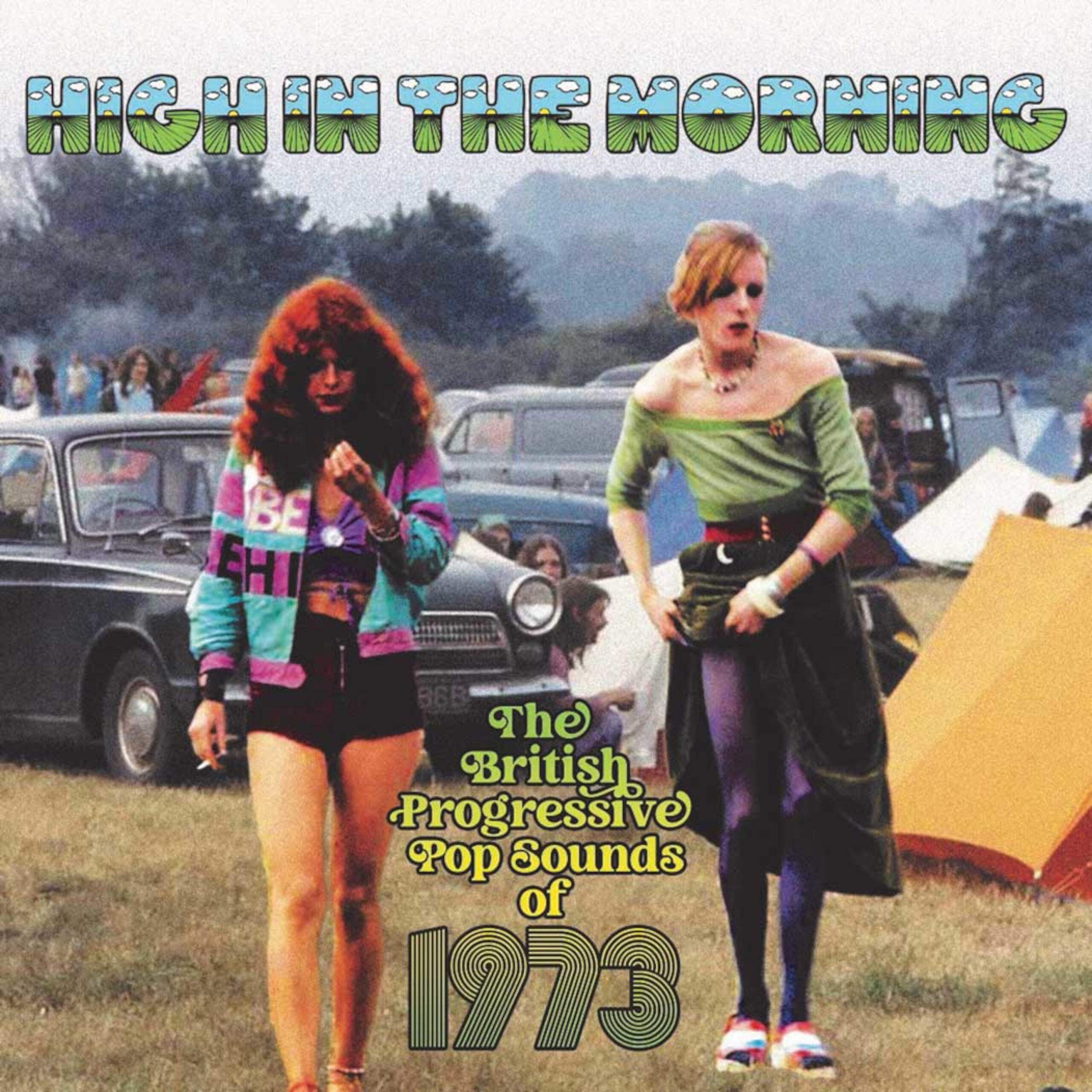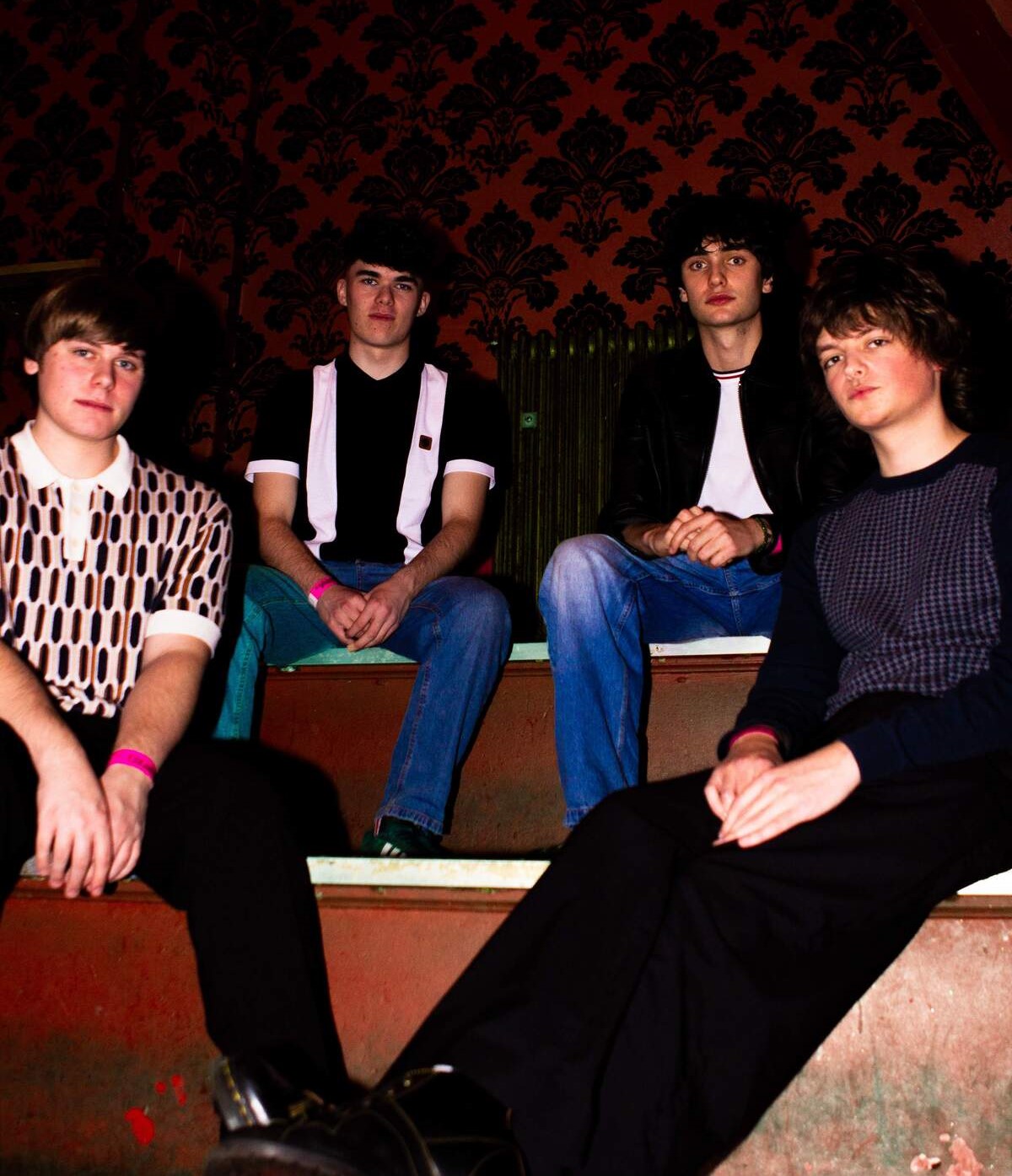Various Artists – ‘High in the Morning: The British Progressive Pop Sounds of 1973’
A young woman resting by a tree, the small cluster of multicoloured tents in the clearing behind her appearing every bit like those erected by wayfaring medieval nomads. Curtains of untamed long hair, striped flared jeans, even a stray top hat amid the laid-back droves. Lengthy dresses flowing gently over the parched August grass as Stacia reclines by an assortment of amplifiers and other such equipment. The subtle smile on her face is framed by an exotically otherworldly array of painted-on cosmic patterns.
These are photographs taken by Alun Anderson, visuals preserved from the second Windsor Free Festival in 1973.
“When these photographs were taken,” Anderson says, “everything about them was everyday and unexceptional. These were the clothes we wore, the Hawkwind festivals that filled our summers, the drugs we took, the love we had, the way we moved. Only looked at from a distance does something extraordinary seem to emerge. Whether it is possible to live in the present with this view of what is around you… I don’t know.”
Certainly, 1973 was an extraordinary year- even if it may not have seemed as such from the perspective of many of those who lived it. After all, this was a year that culminated in the introduction of the Three-Day Week electricity consumption reduction measure in the U.K after internal industrial actions and foreign wars disrupted supplies of coal and oil, respectively. Inflation skyrocketed. Rail workers and civil servants went on mass strikes. Come to think of it, it all sounds eerily familiar.
Yet, even as the gloomy reality of the hungover, post-swinging Seventies continued to hove drearily into view, there could be no denying that popular culture had finally carved out a new frontier distinct from the overtrodden old glories of the psychedelic Sixties.
The previous year had seen glam rock stage a takeover of the singles chart, the standard bearers of the movement- David Bowie, T. Rex, Slade and Roxy Music- arriving fully formed on the staid scene like oh-so-many starmen to pierce “far beyond the pale horizon” of the new decade’s bleak musical prognosis. Their collective influence burst like a glitterbombonto the youth culture and coloured much of what was new and interesting in 1973.
And, even as all the young dudes and the children of the revolution flocked to see Ziggy play guitar with the Spiders, a lumbering caravan of classic albums paraded heavy-footed through the album charts on the pathway to eventual legendary status. ‘Dark Side of the Moon’ by Pink Floyd, ‘Houses of the Holy’ by Led Zeppelin, the Who’s ‘Quadrophenia,’ Mike Oldfield’s ‘Tubular Bells,’ even the debut album from Queen; all these behemoths and more made their first appearances on record racks fifty years ago, back in 1973.
It is to this vital year that Grapefruit Records turned its all-seeing eye towards in the latest instalment of their much-beloved yearly psychedelic/progressive pop retrospectives. Released on September 30th and still readily available, ‘High in the Morning: The British Progressive Pop Sounds of 1973,’ is another essential purchase- and a rebuke for anyone who might be inclined to fool themselves that they have heard all that is worth hearing from the transformative period that was the early Seventies.
Drawing its title from the Rare Bird album cut as featured on Disc One, ‘High in the Morning’ consists of four hours of wildly eclectic material, retreading little overfamiliar ground- choosing instead (as is Grapefruit’s speciality) to peer into the lesser explored nooks and crannies of the wildly competitive industry as it was fifty years back. The accompanying 47-page booklet, written by the esteemed David Wells, engagingly tells each featured artist’s story in turn, placing them into the wider context of 1973 with an almost academic level of precision.
Where we hear from established acts- like Mott the Hoople, the Kinks, Roy Wood, Thin Lizzy and the Faces, to name a few- it is via less often played entries from their much-exhumed discographies, and the fact that they share disc space with such virtual unknowns as Rococo, Mouse, Duffy and Hemlock is never jarring. Instead, each track is an integral piece of the wider jigsaw puzzle that ‘High in the Morning’ represents, a different shade on the variegated colour palette that coalesced to make 1973 such an interesting year in British music. By the time Disc Three closes on Stackridge’s Bonzo Dog Band-style faux dance craze song ‘Do The Stanley,’ it’s difficult not to be impressed by the width and breadth of the content the box set features.
Surprisingly, for all the futurism associated with the era’s post-hippie/glam/space rock confluence, there is a common tendency for the compiled acts to look back over their shoulders rather than forwards. As David Wells notes, acid-folk idiosyncratics Spirogyra very much channel Bowie’s ‘Hunky Dory’ album from two years prior on ‘The Sergeant Says,’ whilst singer-songwriter Al Stewart pays convincing homage to the baroque psychedelia of the high Sixties on the ‘I Am The Walrus’ inspired ‘Terminal Eyes’- a song he knowingly dedicated “to Eggmen Everywhere.”
Meanwhile, Patto are atypically vaudevillian on their White Album-esque ‘Pick Up The Phone’ (as culled from their endearingly poorly titled LP, ‘Monkey’s Bum’), whilst Sonja Kristina’s reformed Curved Air offer up a convincing slice of music hall whimsy on Disc Three track ‘World.’ Roxy Music frontman Brian Ferry harkens back to the protest era with his almost mockingly strange reimagining of Bob Dylan’s apocalyptic ‘A Hard Rain’s A-Gonna Fall,’ Frank White calls back to the days of the Rolling Stones and the Yardbirds with his rendition of ‘Not Fade Away,’ and there is even an authentic, harmonica-and-harmony laden play on the Merseybeat sound of ten years prior, ‘Girl Said To Me,’ courtesy of the aptly named Liverpool Echo.
The ghost of the recent halcyon past is never far beneath the surface, and it is interesting to chart the progress of a number of key 1960s acts attempting to weather the tide of the changing times. There’s material from the resurrected Spencer Davis Group who, having called it a day back in 1968, reformed and cut the country-inflected, freewheeling ‘Legal Eagle Shuffle,’ and one-time God of Hellfire-turned-festival stalwart Arthur Brown leads Kingdom Come through the paces on the blatantly bizarre ‘Slow Rock,’ name dropping such new idols as David Bowie and T Rex as he goes about his way. Another highlight comes via the brooding, mellotron-drenched ‘Buffalo’, the parting shot from former Middle Earth club regulars Writing on the Wall- a song that, in the words of compiler David Wells, “pointedly told the tale of a man ‘who’s been made a slave to contracts.”
The sheer number of worthy acts catalogued on ‘High in the Morning’ who, by some unfortunate fluke, missed out on deserved success is sobering. Take, for instance, the Dana Gillespie-fronted Libido and their Big Pink-era Band meets Honeybus single ‘Hold On To Your Fire.’ One would expect that Gillespie’s close associations with David Bowie and the vocal support of John Peel- who believed that “this could be a very important band indeed”- would vault this single to the upper reaches of the hit parade, but it was not to be. As for former Soft Machine vocalist Kevin Ayers, ‘Caribbean Moon’ represented perhaps the most radio-friendly of his singles to see release but, despite critical acclaim, a singles chart hit remained elusive.
This being the Seventies, however, one does not need to scratch deep to come face to face with that decade’s characteristic sleaze. Just take a look at the titles of glam-rock stompers ‘Dirty Dick’ and ’16 and Savaged’ by Streak and Silverhead for a reminder of how the goalposts of public acceptability have shifted over the past fifty years.
Then there’s Prowler, a group who confessed to be “fascinated with greasy old uncles with smarmy haircuts and late Fifties cars.” As Wells amusingly recounts, the BBC banned their “paedo pop” cut ‘Pale Green Vauxhall Driving Man’ not on account of its theme, but rather because its inclusion of the Vauxhall company name violated their rules on advertising- “you could cheerfully release a song about a child molester in the early Seventies,” he wryly notes, “but weren’t allowed to mention a brand of car.” Audiences at the time, as such, were instead treated to a re-recorded version of the song entitled- wait for it- ‘Pale Green (Hmmm) Driving Man.’ Needless to say, it wasn’t a hit.
There are also a number of glimpses into the crystal ball as to the next tectonic shift in British music, still just a few years out of reach. The sentiment of Hawkwind’s ‘Urban Guerilla’ (“let’s not talk of love and flowers and things that don’t explode,” expound anarchic lyrics that Dave Brock later stated he believed to be “what everything was about in the Seventies”) would not be out of place if cut in 1977, but, released as it was unintentionally parallel to an I.R.A bombing campaign in London, it was promptly banned from airplay and withdrawn from sale.
Likewise, the Pink Fairies’ scorching, riff-laden ‘City Kids’ presages much of the sound and aesthetic of what would come to be known as punk, whilst England’s Glory managed to channel Lou Reed- a key influence on the sound of ’77- on tracks like ‘Showdown’ so authentically that when heard by the rakish rock critic Nick Kent, he was “allegedly almost fooled” into believing he was listening to a bootlegged demo recorded by the Velvet Underground. There is also an insight into the burgeoning pub rock scene by way of a selection from Duck’s Deluxe, ‘Too Hot To Handle,’ that highlights the grounded, rootsy music increasingly performed in small venues far removed from the preening pomp of glam.
By the end of 1973, the wheels of change were already on the turn again, no doubt to the relief of the jaded Alex Harvey. “Somethings got to come along soon,” he said in an interview in November of that year, “and it’s not going to be glam rock or the New York Dolls, or anything like that, because these are in the format- even Slade is, we are.”
Indeed, he was not alone in voicing such concern for where exactly the growingly rudderless music scene was heading. The gimmickry of glam was no longer shocking and its first wave appeared to be petering out. July 3rd had seen David Bowie stun both his audience and his bandmates at the Hammersmith Odeon when, with no prior indication of intent, he abruptly retired his Ziggy Stardust persona onstage and disbanded the Spiders from Mars. Marc Bolan, meanwhile, grabbed the headlines of a June issue of Melody Maker with the striking declaration that “glam rock is dead”- less than two years after he’d unleashed the genre onto the British public with his iconic March 1971 Top of the Pops performance of ‘Hot Love.’
“Somebody’s got to come along that won’t be in the format,” Harvey continued, “and I haven’t got a clue what it’s going to be. Something that’ll be the equivalent of rock and roll, which came along and said ‘fuck you’ to all this… Something’s going to come along that’s going to do that to rock. And we’ll all ask, ‘what’s going on?’ I think it’s got to happen.”
As David Wells writes, Harvey’s “feeling in late 1973 that something seismic was just around the corner proved to be correct, even if he’d have to wait a little while for the revolution to arrive.” Nonetheless, ‘High in the Morning’ serves as an eccentric and eclectic reminder that the period between the Beatles and the emergence of punk was no drab cultural wasteland. As such, this is a superb addition to Grapefruit Records’ growing discography of retrospectives, suitable for both the casual listener and the serious collector. ‘High in the Morning’ has already drawn a number of well-deserved positive reviews, and stands as yet another jewel in the crown of this acclaimed Cherry Red subsidiary. Come on feel the noise, indeed.
Jack Hopkin
Various Artists – ‘High in the Morning: The British Progressive Pop Sounds of 1973’ (Grapefruit Records)




